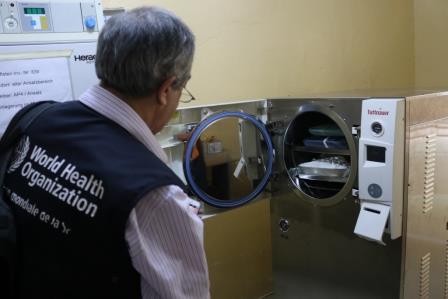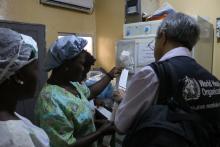The Ministry of Health and World Health organization Conclude a 3-day advanced Infection Prevention Control (IPC)Follow Up training Workshop for County and Hospital IPC Focal Persons

Monrovia, 10 December 2017: In August 2017, the first ever global pilot of the advanced infection prevention and control (IPC) training package, developed by the World Health Organization (WHO) IPC global unit with international experts, was held in Monrovia, Liberia. The goal was to build national capacity with a focus on IPC implementation as outlined in the recently published guidelines on Core Components of Infection Prevention and Control Programmes at the National and Acute Care Facility Level.
Building on the momentum from the August 2017 pilot, the Ministry of Health (MoH) Liberia, in collaboration with WHO Country Office Liberia, IPC Global Unit and the Centers for Disease Control and Prevention (CDC), held a 3-day advanced IPC follow up workshop in Monrovia from 20-22 November 2017, delving into two specific topic areas (surgical site infection (SSI) surveillance and medical device reprocessing) and acquiring participant feedback on their recent experience with IPC implementation to share best practices moving forward.
This workshop included 42 participants, 8 laboratory staff and 34 IPC focal persons. Representation included the national reference laboratory, county, hospital and IPC implementing partners from across Liberia. Other collaborating partner of the Ministry of Health present at the training was Academic Consortium Combating Ebola in Liberia (ACCEL). Academic institutions present included: Phebe Paramedical Training Program (PTP) and Tubman National Institute of Medial Arts (TNIMA).
In her opening remarks Dr. Kainne Dokubo, Deputy Director at the CDC country office in Liberia expressed gratitude to the MoH and partners, including WHO, for their continued commitment towards building a resilient health system for Liberia, in which infection prevention and control plays a critical role. She urged participants to consider the training as an opportunity to maximize their potential in the performance of their duties and responsibilities to the country.
Dr. Alex Gasasira, WHO Representative (WR) to Liberia, acknowledged the MoH, CDC and other health partners for their high-level involvement in IPC programs in Liberia. WR emphasized that the success of an IPC programme depends on a strong partnership and commitment of various institutions including academic, research and both public and private sectors. Dr. Gasasira reaffirmed WHO’s continued support to such initiatives in building the country’s health sector and striving towards delivering quality health services to our patients and communities.
Speaking on behalf of the Minister of Health for the Republic of Liberia Dr. Ngormbu Ballah, Director of the Quality Management Unit, lauded WHO and all partners for supporting the Liberian Government, in the areas of IPC and healthcare quality improvement. He reminded participants that gone are the days when staff only attend trainings without action or follow up, emphasizing that participants will develop action plans for implementation in their respective healthcare facilities to bring positive change in IPC in at least 1 of 5 areas: surgical site infection prevention, peripheral intravenous catheters, urinary catheters, decontamination and reprocessing of medical devices, and injection safety.
During the workshop, participants from Maryland, Bomi, Montserrado and Nimba Counties presented on projects that were implemented in their respective counties after the Advanced IPC Pilot Training that was held in August 2017. Examples of the projects are: Surgical site infection (SSI), bi-weekly hospital staff training using the Advance IPC Training Pilot modules, and the introduction of patient ID badges.
Participants are now expected to conduct IPC practicum exercises in their respective health facilities to identify gaps and prepare work plans prioritizing 1-2 actionable items at their level (low hanging fruits).
Technical: Dr. April Baller
+231776281126
ballera [at] who.int (ballera[at]who[dot]int)




